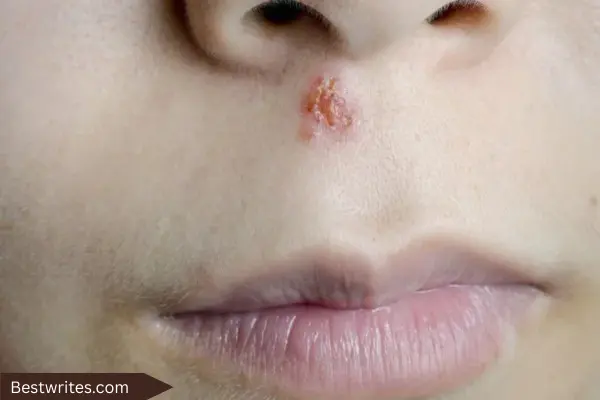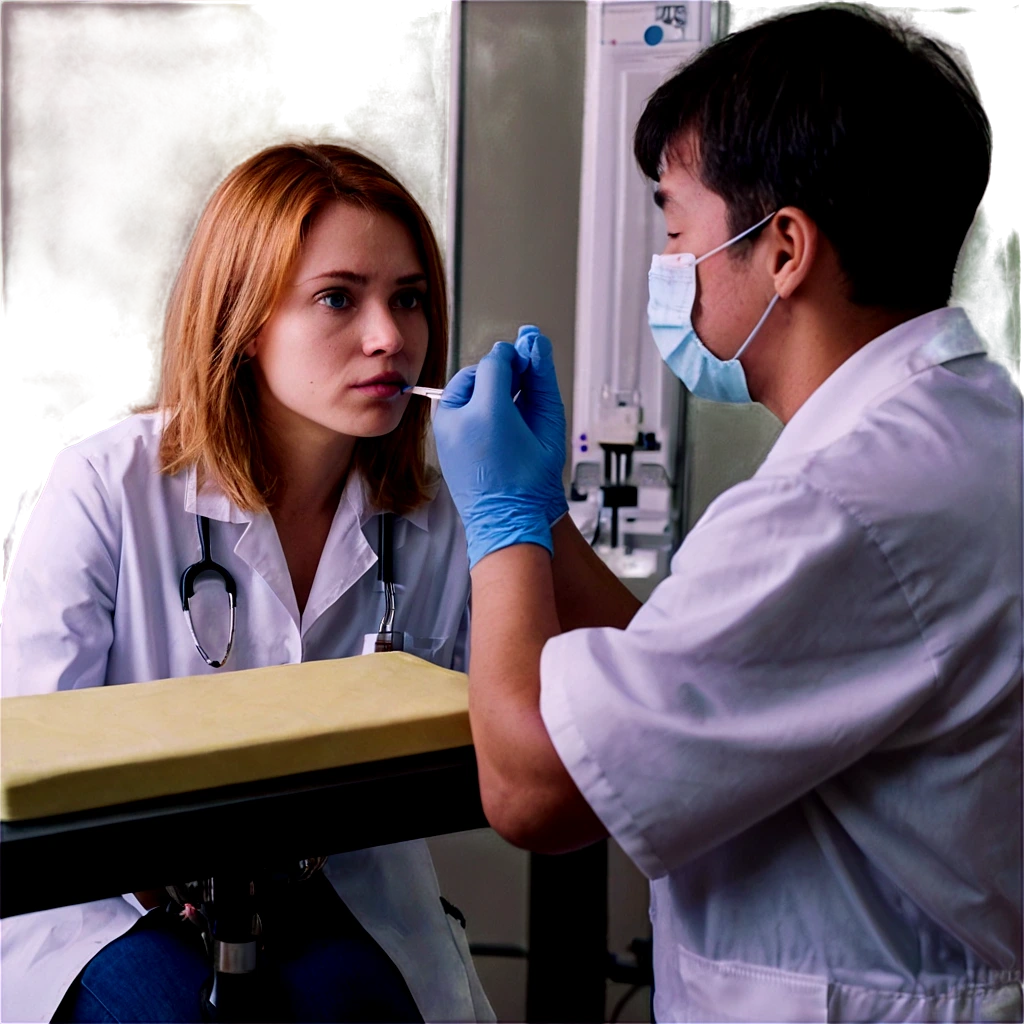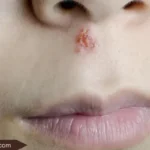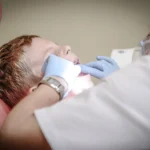“Herpes Inside Nose: Symptoms, Causes, and Treatment”
Discussing the most common diseases in in America, you can find herpes as a commonly found infection. Herpes Inside Nose is a type of HSV-1 infection that affects the nose, caused by the herpes simplex virus type 1. It often manifests as painful blisters or sores inside or around the nostrils. HSV-1, the same virus responsible for oral cold sores, typically causes the severe condition. While many people associate herpes with the mouth or genitals, it can also affect the nasal area, especially during initial outbreaks or viral shedding. The infection may start with tingling or burning sensations, followed by visible sores. Although not life-threatening, it can be uncomfortable and recurring.
What is Herpes Inside the Nose?
It occurs when HSV-1, the herpes simplex virus, infects the soft tissues of the nasal cavity. Unlike a common cold sore that appears on the lips, a viral infection inside the nostril affects the internal skin lining, often causing swelling, irritation, and sometimes scabbing. It creates a painful blister in the nose that makes breathing through the nostril uncomfortable and may be mistaken for a pimple or ingrown hair. However, unlike those, herpes blisters are usually grouped, fluid-filled, and accompanied by burning or itching. Nasal herpes is contagious and can recur due to stress or a weakened immune system.
Is Herpes Inside the Nose Contagious?
Yes, herpes inside the nose is highly contagious, especially during an active outbreak when sores are present. The virus can easily spread through direct skin-to-skin contact or by touching contaminated surfaces and then touching your nose or mouth. Understanding how it spreads and how to reduce the risk of transmission is essential for your health and the safety of others.
Symptoms of Nasal Herpes:
Recognizing the symptoms of herpes simplex virus (HSV) infection, specifically those related to the nose, is crucial for early diagnosis and treatment. If you find out the following signs in you or any other family member, you must seek medical attention, and these signs include:
1.Tingling or Burning Sensation Inside the Nose:
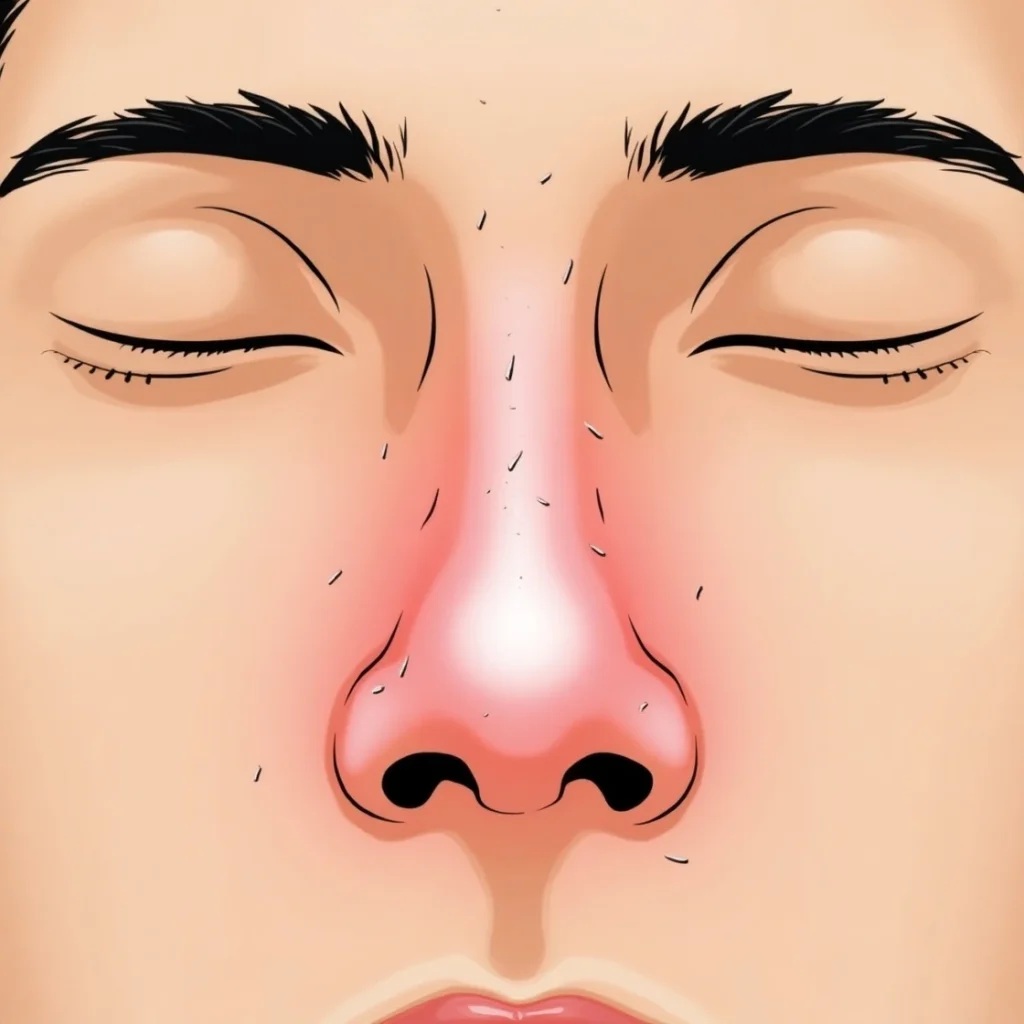
One of the first noticeable symptoms of nasal herpes is a tingling, itching, or burning sensation in the nose. This discomfort typically occurs before any visible sores appear and may signal the beginning of an outbreak.
2. Painful Blisters or Sores:
As the virus becomes active, internal nasal blisters or sores begin to form. These blisters are small, fluid-filled, and often appear in clusters. They may cause sharp pain, especially when touched or during nasal cleaning.
3. Scabbing and Crust Formation:
After the blisters rupture, they dry out and develop a crust or scab. This stage is part of the healing process, but it can be unpleasant, especially in sensitive areas like the nostrils.
4. Recurrent Outbreaks:
Recurrent nasal herpes is common in individuals with HSV-1. Triggers such as stress, illness, or a weakened immune system can reactivate the virus, leading to new outbreaks in or around the same area inside the nose.
Each of these herpes symptoms may vary in intensity from person to person, but recognizing them early helps manage and minimize discomfort effectively.
How It Spreads?
Herpes inside the nose, typically caused by HSV-1, spreads through direct contact with the infected area, such as kissing, touching nasal sores, or sharing personal items like towels, razors, or tissues. Even when no visible blisters are present, viral shedding can occur, allowing the virus to be transmitted nonetheless. A cold sore inside the nostril can also spread to other areas of your face, including the mouth or eyes, if proper hygiene isn’t followed.
If you’re experiencing a sore inside your nose that’s not healing and is painful or recurs frequently, it could be a sign of a herpes simplex infection, which requires proper care and diagnosis.
Causes and Triggers:
We define both separately so you can understand them well:
Causes of Nasal Herpes:
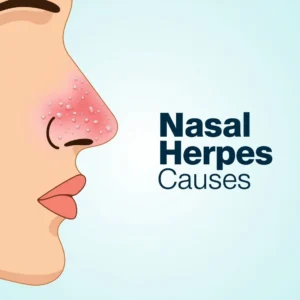
The primary cause of nasal herpes is the Herpes Simplex Virus, most often HSV-1. As this virus is highly contagious and spreads through direct contact with infected skin or bodily fluids, once contracted, the virus remains dormant in the nerve cells and can reactivate later. In many cases, the initial infection occurs during childhood through non-sexual contact such as kissing or sharing personal items. When the virus becomes active again, it can manifest as a contagious nasal sore, often located inside the nostrils. Although HSV-1 typically causes oral herpes, it can easily spread to the nose, primarily through hand-to-face contact.
Triggers for Recurrence:
Even after the initial outbreak has healed, the virus can remain dormant in the body and reactivate in response to specific triggers. Common triggers for nasal herpes include emotional or physical stress, weakened immunity, fever, or other illnesses. Environmental factors, such as sun exposure, can also trigger an outbreak. During these flare-ups, symptoms such as tingling, blistering, and scabbing may reappear in the same spot. Knowing your triggers is key in managing the condition and minimizing recurrences. While learning how to treat herpes in the nose, many people benefit from using an antiviral cream for nasal herpes, which can accelerate healing and alleviate discomfort.
How is It Diagnosed?
Accurate diagnosis is crucial when managing a herpes simplex virus outbreak on the nose. Since symptoms may resemble other skin or nasal conditions, proper testing ensures effective treatment. Below are the primary diagnostic methods used to diagnose herpes. Have a look:
1. Clinical Examination:
A doctor typically begins by visually inspecting the affected area during a clinical examination. They look for the typical appearance of herpes, which includes clusters of fluid-filled blisters, redness, and inflammation inside or around the nostrils. These signs often help distinguish herpes from other conditions, such as bacterial infections or ingrown hairs. In many cases, an experienced clinician can identify herpes by appearance alone.
2. Swab Test or Viral Culture:
To confirm the presence of the herpes virus, a swab test or viral culture is performed. This involves gently swabbing the fluid from an active sore and testing it in a lab for the herpes simplex virus (usually HSV-1). This method is especially effective during the early stages of a herpes simplex nose outbreak, when lesions are still fresh and active. It provides definitive evidence of the virus causing the symptoms.
3. Blood Test (For Recurring Infections):
For individuals experiencing repeated or unclear symptoms, a blood test may be ordered. This test detects antibodies to HSV-1 and HSV-2 in the bloodstream, helping confirm whether the person has had a past infection. It’s beneficial when blisters are not currently present. If you’re wondering, what causes herpes in the nose? This test can help determine if recurring nasal sores are related to a chronic HSV-1 infection.
Treatment Options:
Managing herpes inside the nose involves a combination of medical treatments and home remedies that provide support. If you’re wondering how to treat herpes in the nose? The answer depends on the severity and frequency of your outbreaks. Here are the most effective treatment approaches:
1. Antiviral Creams (Acyclovir, Valacyclovir):
One of the most common methods of treating a cold sore on the nose involves applying topical antiviral creams, such as acyclovir or valacyclovir. These creams help reduce viral replication, alleviate discomfort, and accelerate the healing of blisters. They work best when applied at the first sign of nasal symptoms, such as tingling or itching. While these creams may not completely prevent future outbreaks, they can significantly reduce the duration and severity of active ones.
2. Oral Antiviral Medications:
For more serious or recurrent outbreaks, doctors often prescribe oral antiviral medications. These are stronger than topical treatments and work systemically to combat the herpes virus from within. Medications such as valacyclovir, acyclovir, or famciclovir can help suppress the virus, especially in patients who experience frequent herpes simplex outbreaks on the nose. Oral medication is often part of a long-term treatment regimen for herpes on the nose, especially for individuals with weakened immune systems or those with chronic conditions.
3. Natural Remedies (Aloe Vera, Lysine, Cold Compress):
In addition to medical treatment, many people find relief through natural remedies. Aloe vera has soothing and antiviral properties that can calm inflammation and reduce pain. Lysine, an amino acid, is often taken as a supplement to help reduce the frequency of outbreaks. Applying a cold compress to the affected area can also help reduce swelling and temporarily numb the pain. These remedies may not cure the infection, but they can help provide comfort and support healing during flare-ups.
4. When to Consult a Doctor:
While most cases of nasal herpes can be managed at home, it’s essential to know when to seek medical attention. If the sores persist longer than 10 days, worsen, or are accompanied by severe pain, fever, or spreading lesions, consult a healthcare provider. This is especially important for individuals with weakened immune systems, as complications may arise. A doctor can recommend personalized treatment for herpes on the nose and monitor for any signs of secondary infection.
Home Remedies & Self-care Tips:
Managing nasal herpes at home involves maintaining consistent hygiene, supporting the immune system, and avoiding known triggers. While medical treatment is often necessary, practicing effective home remedies for nose herpes can ease discomfort, reduce healing time, and help prevent future outbreaks. Below are some essential self-care strategies to follow:
1. Hygiene Tips:
Keeping the nasal area clean is crucial during an active outbreak. Gently wash the affected area with mild soap and warm water to prevent secondary infections. Avoid picking or scratching, especially if you notice a scab on your nose from herpes, as this can delay healing and increase the risk of the virus spreading. Use a clean tissue or cotton swab when applying topical treatments, and always wash your hands before and after touching your face. Maintaining good nasal hygiene can significantly reduce irritation and promote faster recovery.
2. Boosting Immunity:
A strong immune system can help your body keep the herpes virus dormant and reduce the frequency of flare-ups. Eat a balanced diet rich in fruits, vegetables, and lean proteins. Supplements such as vitamin C, zinc, and lysine may also support immune function and reduce the severity of outbreaks. Staying hydrated, getting enough sleep, and managing stress are all essential components of natural home remedies for nose herpes that support long-term wellness.
3. Avoiding Triggers:
Many people with nasal herpes experience flare-ups triggered by stress, illness, sun exposure, or fatigue. Keep a personal health journal to identify the factors that trigger your outbreaks. Once identified, work on managing these triggers—use sunscreen if you’re prone to outbreaks from sun exposure, practice stress-relief techniques like meditation, and get proper rest when you’re feeling rundown. Avoiding these common factors can help prevent another herpes-related nose scab from forming.
Preventive Measures to Reduce Transmission:
To reduce the risk of spreading nasal herpes:
- Avoid touching the sore or rubbing your nose during an outbreak.
- Wash your hands frequently, especially after applying creams or ointments.
- Do not share items such as towels, lip balm, or utensils.
- Avoid close physical contact, such as kissing, during active outbreaks.
- Use antiviral medications as prescribed to reduce the frequency and severity of outbreaks.
If you’re wondering, “How do I know if I have herpes inside my nose?” look for early symptoms like tingling, burning, or small fluid-filled blisters. If these signs appear repeatedly or don’t heal, consult a doctor for proper diagnosis and management.
Practicing these self-care tips alongside medical treatments creates a balanced and practical plan to manage nasal herpes naturally and comfortably.
FAQs of Herpes Inside Nose:
Can HSV-1 cause sores in the nose?
Yes, HSV-1 is a common cause of cold sores inside the nostril and the condition is referred to as nasal herpes and typically results in small, painful blisters or sores within the nostrils.
How long do herpes sores last?
It typically last between 7 and 14 days and if you’re experiencing a sore inside your nose that isn’t healing, it could be a sign of a more serious infection or another condition, and you should consult a healthcare provider.
Can nasal sores be mistaken for something else?
Yes, nasal herpes symptoms can sometimes be confused with ingrown hairs, bacterial infections, or pimples. If you’re unsure whether you have herpes inside your nose, a doctor can perform a swab test or a blood test to confirm the diagnosis.
Can cold sores appear inside the nostrils?
Absolutely. While cold sores are commonly seen on the lips, cold sore inside the nostrils is also a manifestation of HSV-1. The virus can affect the soft tissues inside the nose, causing pain, redness, and blistering.
What triggers nasal herpes outbreaks?
Common triggers include stress, sun exposure, weakened immunity, illness, and fatigue. These factors can reactivate the dormant herpes virus, leading to a new outbreak of herpes simplex on the nose.
Conclusion:
Nasal herpes, caused by HSV-1, may not be as widely recognized as oral cold sores, but it can be just as uncomfortable and disruptive. From the first signs of tingling or burning to the appearance of internal blisters, understanding the symptoms of a herpes simplex outbreak on the nose is essential. We’ve explored how the virus spreads, the importance of hygiene, and both medical and natural treatment options, including home remedies for nose herpes.
Early diagnosis and proper management play a critical role in reducing pain, preventing transmission, and avoiding complications. If you notice a cold sore inside your nostril or a sore inside your nose that is not healing, seek medical advice promptly. With the right care and preventive measures, nasal herpes can be effectively controlled, allowing you to minimize outbreaks and live more comfortably.
